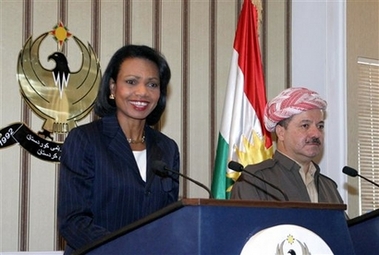 IRBIL, Iraq - By ANNE GEARAN, AP - Fri Oct 6, 8:07 AM ET - Convinced oil revenue is the long-term key to economic independence for a unified Iraq, Secretary of State Condoleezza Rice appealed Friday for cooperation from the autonomous and oil rich Kurdish north.
IRBIL, Iraq - By ANNE GEARAN, AP - Fri Oct 6, 8:07 AM ET - Convinced oil revenue is the long-term key to economic independence for a unified Iraq, Secretary of State Condoleezza Rice appealed Friday for cooperation from the autonomous and oil rich Kurdish north.  |
| AP Photo: U.S. Secretary of State Condoleezza Rice and Iraq's Kurdish region president Massoud Barzani talk... |
Rice visited the region's powerful president, Massoud Barzani, less than two weeks after the regional government threatened to break away from Iraq in a dispute over oil.
After a session with their staff, followed by a lengthy one-on-one meeting at the Kurdish government offices in Irbil, Rice and Barzani stood in front of U.S. and Kurdish flags and spoke to reporters.
Barzani, speaking in Kurdish through an interpreter, said Kurdistan, "like any other nation, has the right to self-determination." However, he said he is committed to a "federal democratic and pluralistic Iraq."
For her part, Rice thanked Barzani for the Kurds' long cooperation with the United States, adding, "and I appreciate also your important participation in the process of national reconciliation. Thank you."
When he was asked about the future distribution of oil wealth, Barzani did not repeat recent assertions that Kurdistan alone should control new contracts and business arrangements for oil pumped in the region. But at the same time, he gave no endorsement of proposed national legislation on dividing up income from oil.
Rice's two-day trip to Iraq is meant to show U.S. support for the country's fragile central government, under assault by a spiral of sectarian violence and growing calls for autonomy among Iraq's regions.
Rice's departure from Irbil was delayed Friday, disrupting plans for a key meeting on Iran's nuclear ambitions later in the day in London.
Rice had to wait about two hours for a replacement plane because of mechanical problems discovered in the C-17 military transport that was supposed to ferry her to Turkey, where another jet was waiting to fly her to London.
The delay meant Rice would arrive late for a meeting with foreign ministers from Britain, France, Germany, Russia and China. The group still planned to meet but would be unable to finish its business and refer Iran to the U.N. Security Council on Friday as had been expected, said State Department spokesman Sean McCormack, who was traveling with the secretary.
In Iraq, fears of Kurdish secession have risen in recent weeks, especially when Barzani briefly banned the display of the Iraqi flag in government buildings.
The oil dispute reflects the larger fight over federal control in Iraq.
Although the parliament briefly averted a crisis over the Kurdish threat last month, leaders have been unable to pass a federal law on the distribution of oil wealth
The U.S. and other international backers want quick action on a law that would streamline the complicated oil sector, attract foreign investment and provide for equitable distribution of oil profits across Iraq.
Oil is still pumping at prewar levels more than three years after the invasion that toppled the former president of Iraq, Saddam Hussein.
Oil resources are now governed by vague terms in the national constitution written last year.
Energy analysts estimate oil revenues make up more than 95 percent of Iraq's domestic budget.
Since the Gulf War of 1991 the Kurdish north had been out of Saddam's control and the Kurds established their autonomous region under U.S. and British protection. After the U.S.-led invasion and occupation of Iraq, Kurdistan was the only region that did not witness major changes.
Iraq's new constitution recognizes Kurdish self-rule and provides a legal mechanism for other areas to govern themselves but within the Iraqi state.
Sunni Arabs, who had enjoyed control over Iraq under Saddam, now fear the Kurdish push for secession under the nation's new federal system. Should the Shiite majority in the oil-rich south follow suit, the Sunnis would find themselves with little more than date groves and sand.


